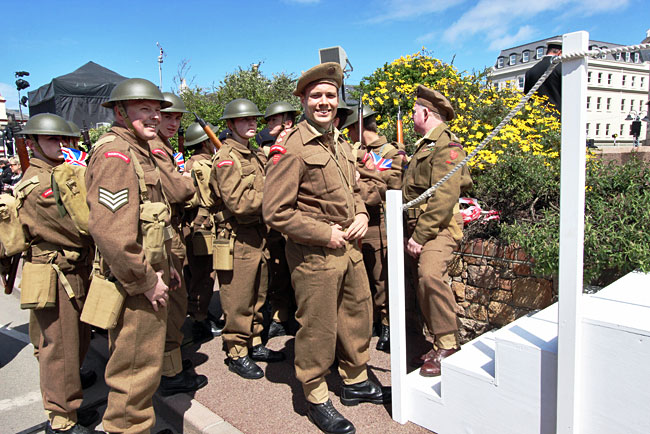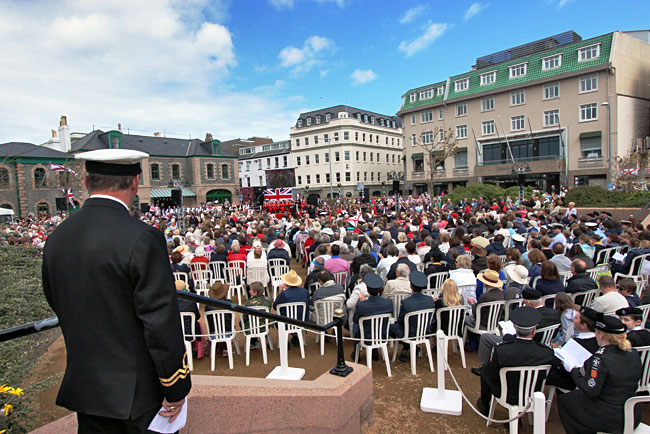The crowd assembled in Liberation Square gripped their small British flags, eagerly awaiting the moment when re-enactors would come pouring into the plaza, dressed in vintage WWII uniforms. As the last strains of “Beautiful Jersey” faded away, cadets from the Royal Jersey Militia Army mounted a rear wall and came rushing through the onlookers, handing out hard candy and apples. Joyful cheers and frenzied flag-waving egged the soldiers on to the second floor balcony of the Pomme d’Or Hotel, where they raised the Union Jack, just as they’d done 68 years earlier during the liberation of Jersey from German occupation.

Perhaps because of their location just a handful of miles off the coast of France, the Channel Islands, which include Jersey, Guernsey, Sark and eleven other small islands, were the only bits of British soil ever captured by the Germans during World War II. Early in the morning on July 1, 1940, a German ultimatum was dropped over the Isle of Jersey, the largest of the Channel Islands. Residents were commanded to show their surrender by flying white flags over all the buildings. They complied by hanging out sheets and pillowcases and painting a white cross in the middle of Royal Square. Bailiff Coutanche appealed to islanders to stay calm and follow German orders, then drove to the airport to meet the invaders, who promptly commandeered the Pomme d’Or Hotel as its headquarters and raised the detested swastika from its second floor balcony.
On the 19th of July, residents were told to register at the Town Hall by 10 a.m. the following morning if they wished to leave. Standing in queues for hours under a blistering sun, 23,063 people registered to leave – more than 50% of the island’s population. For those who stayed, life was not immediately difficult. They held all-night dances to beat the curfew imposed by the Germans and there were still concerts, dramas, and German films shown at the cinema. School continued throughout the occupation, but when it became difficult to heat classrooms due to lack of fuel, the school day was shortened. In 1942, after children had refused to volunteer to study German the prior year, German language classes were made compulsory.

Some islanders chose fraternization with the Germans to ease the difficulties of life under occupation. Women who dated the handsome German soldiers in return for special privileges or protection were known as ‘Jerry bags’ and widely detested. As a result, the occupation made everyone nervous; it was impossible to know who to trust.
There were small sources of comfort; residents were allowed to send 25-word messages to friends and family through the Red Cross. Many of these contained references to “Mother Hubbard” that mystified the Germans but were a clear message to Brits that their cupboards were bare. Other notes were more sinister in nature, pitting neighbor against neighbor when it became clear that some residents had more food and warmer clothes.
Addressed simply to “The Gestapo,” one said, “Why is Jack Le Bormu…allowed to have received one ton of anthracite coal when other people have none at all. Also, call and see his stock of food in bedroom cupboards, and billiard room, and see what you think of it???”
Another read, “Mrs. Noble, Hogue-Ville, Trinity Hill has hidden her wireless in the soot house in garden.”

A number of these notes are displayed at the Jersey War Tunnels, a German Underground Hospital constructed between 1941-44 by forced and slave workers. Today the hospital is a museum that tells the story of the occupation of Jersey during World War II.
Although the island’s daily newspaper, The Evening Post, continued to be published throughout the occupation, strict censorship was imposed and the Germans used it to distribute propaganda. Residents knew which articles had been written by the Germans, however, as the editor purposely left their English uncorrected. The situation on Jersey began to deteriorate by the autumn of 1942, when an article in the newspaper announced that British-born islanders were to be deported to Germany. Furious over the British deportation of German citizens working in Iran, Hitler declared that Channel Islanders be used as a bargaining tool. Within three days, 1,186 islanders were sent to three camps in Germany, where they stayed until the end of the war. A second wave of deportations in 1943 was conducted in retaliation for a British commando raid on the island of Sark.
As the war drew to a close, the people of Jersey had suffered an occupation lasting nearly five years and many were near starvation. Eagerly, they awaited news of liberation, which came in a speech made by Winston Churchill in London on May 8, 1945, during which he announced, “…and our dear Channel Islands are also to be freed today.” The following morning, the British destroyer HMS Beagle sailed into St. Aubin’s Bay and two naval officers rode a launch into the harbor, where they were “greeted by ecstatic crowds who lifted them onto their shoulders and brought them down to the Weighbridge (square).”
The simple acts of exchanging the swastika for the British flag is reenacted every year on May 9th during Jersey’s Liberation Day Festivities. The ceremony is a poignant remembrance, not only of the deprivations and sacrifices suffered by islanders during the occupation, but also a symbol of the peace and good fortune that has come to pass since that day.

I went to Jersey for a family holiday in 1959 when I was 14. We went around the underground hospital which back then had been left much as it was in 1945.
There were no guides to take anyone around but I remember one of the leaflets saying that starved slave workers who collapsed and died, were thrown in to the still wet concrete and work just carried on.
This made my skin creep and I remember rubbing a tentive hand over the concrete wall, wondering if there were the remains of a poor woker underneath.
Oh my, Trevor. I’m glad I didn’t know that when I toured the old hospital. It DID feel pretty creepy inside it, though, so maybe I was feeling the left-over energy. Thanks so much for sharing your story.
Who were the two naval officers who rode into the harbour off the HMS Beagle? I believe my grandfather may have been one of them..
I don’t know, Brian, but it would be fascinating if your grandfather was one of them. If you ever find out more, please come back and share it here!
Thank you for sharing this insightful story about the occupation of Jersey. I knew nothing about it before reading your article.
You’re not alone, Mary. I think a lot of Brits don’t know much about it either.
Very interesting article. I also had no idea about this!
I had no idea about this, and I’m a Brit…a Brit who has been to Jersey. I knew the islands were occupied during WWII, but that’s about it. Then again I was about thirteen at the time, and going to the zoo and buying computer games on my annual summer holiday was a lot more important to me than learning about history back then.
Hi Tom! Glad to serve, however briefly, as your history teacher. That made me grin!
Wow, what an amazing story! I had no idea even though I’m a huge history buff.
Me neither, Matt. It’s amazing how much we learn when we travel.